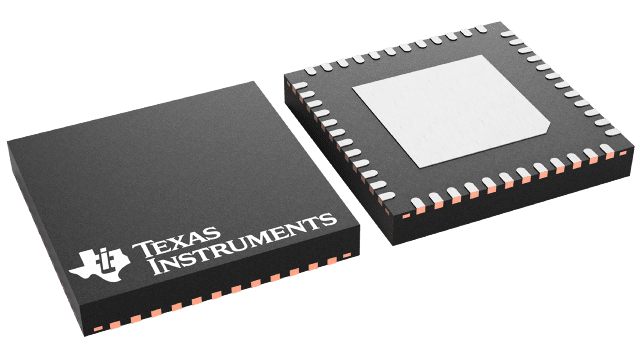Packaging information
| Package | Pins VQFN (RGZ) | 48 |
| Operating temperature range (°C) -40 to 85 |
| Package qty | Carrier 2,500 | LARGE T&R |
Features for the SN65MLVD040
- Low-Voltage Differential 30Ω to 55Ω Line Drivers and Receivers for Signaling Rates(1) Up to 250Mbps; Clock Frequencies Up to 125MHz
- Meets or Exceeds the M-LVDS Standard TIA/EIA-899 for Multipoint Data Interchange
- Controlled Driver Output Voltage Transition Times for Improved Signal Quality
- –1V to 3.4V Common-Mode Voltage Range Allows Data Transfer With 2V of Ground Noise
- Bus Pins High Impedance When Driver Disabled or VCC ≤ 1.5V
- Independent Enables for each Driver and Receiver
- Enhanced ESD Protection: 7kV HBM on all Pins
- 48 pin 7 X 7 QFN (RGZ)
- M-LVDS Bus Power Up/Down Glitch Free
Description for the SN65MLVD040
The SN65MLVD040 provides four half-duplex transceivers for transmitting and receiving Multipoint-Low-Voltage Differential Signals in full compliance with the TIA/EIA-899 (M-LVDS) standard, which are optimized to operate at signaling rates up to 250Mbps. The driver outputs have been designed to support multipoint buses presenting loads as low as 30Ω and incorporates controlled transition times to allow for stubs off of the backplane transmission line.
The M-LVDS standard defines two types of receivers, designated as Type-1 and Type-2. Type-1 receivers have thresholds centered about zero with 25mV of hysteresis to prevent output oscillations with loss of input; Type-2 receivers implement a failsafe by using an offset threshold. The xFSEN pins is used to select the Type-1 and Type-2 receiver for each of the channels. In addition, the driver rise and fall times are between 1ns and 2ns, complying with the M-LVDS standard to provide operation at 250Mbps while also accommodating stubs on the bus. Receiver outputs are slew rate controlled to reduce EMI and crosstalk effects associated with large current surges. The M-LVDS standard allows for 32 nodes on the bus providing a high-speed replacement for RS-485 where lower common-mode can be tolerated or when higher signaling rates are needed.
The driver logic inputs and the receiver logic outputs are on separate pins rather than tied together as in some transceiver designs. The drivers have separate enables (DE) and so does the receivers ( RE). This arrangement of separate logic inputs, logic outputs, and enable pins allows for a listen-while-talking operation. The devices are characterized for operation from –40°C to 85°C.
